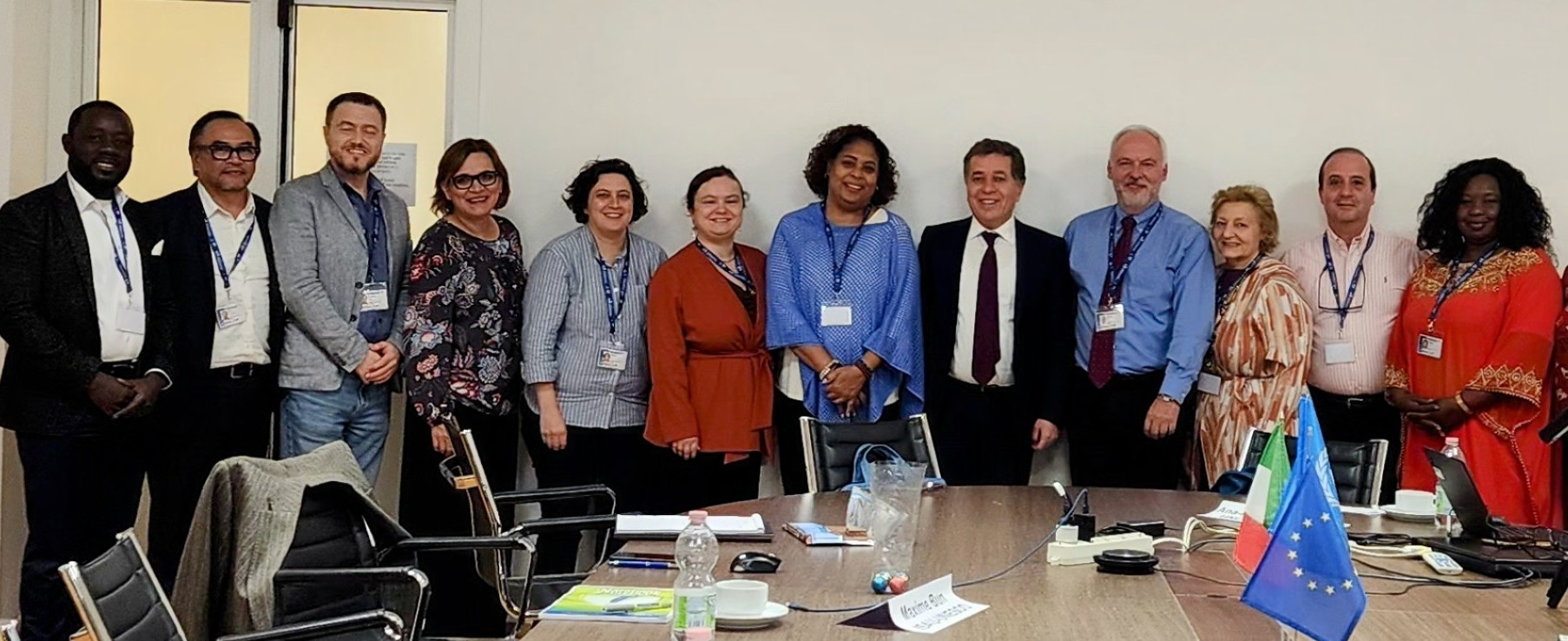
While our Union does not have a direct role to play in the UN Common System, our interests are represented through staff federations.
The federations have a formal role in a variety of high-level bodies and Common System fora. These include the International Civil Service Commission; the High-Level Committee on Management; the United Nations Joint Staff Pension Fund; and the Inter-Agency Security Management Network.
Previously, our Union was an active member of the Coordinating Committee of International Staff Unions and Associations (CCISUA). In December 2022 we joined another staff federation, the United Nations International Civil Servants Federation (UNISERV). In September 2023, the President of our Staff Union was elected as new President of UNISERV.

The International Civil Service Commission (ICSC) is an independent expert body established by the United Nations General Assembly. Its mandate is to regulate and coordinate the conditions of service of staff in the United Nations common system, while promoting and maintaining high standards in the international civil service.
The Commission is composed of fifteen members who serve in their personal capacity. They are appointed by the General Assembly for four-year terms, with due regard for broad geographical representation. The Chairman and the Vice-Chairman are full-time members and are based in New York. The full Commission meets twice a year.
Our staff federation represents its membership in ICSC working groups on issues such as General Service salary survey methodology, hardship duty station classification, harmonization of conditions of service in non-family duty stations, review of the post adjustment system and operational rules, increases in pensionable remuneration, parental leave, standards of conduct for the international civil service or HR framework.
On behalf of our former federation, CCISUA, our Union actively participated in the ICSC Working Group on Parental Leave, and the ICSC Working Group on GS Salary Survey Methodologies, including its Task Force on Local Salaries.
Currently, through our new federation, UNISERV, our Union is represented in the ICSC Working Group on Standards of Conduct for the International Civil Service, and the ICSC Working Group on the Comprehensive Review of the Compensation Package.
All facets of the UN common system staff employment conditions are covered by the Commission’s mandate. The ICSC website contains a wealth of important and useful information and all staff members are encouraged to familiarize themselves with it. The ICSC Library contains publications pertaining to Salaries, Allowances and Benefits, a Guide to the Mobility and Hardship Scheme and Related Arrangements (i.e. the field package), and the Post Adjustment System; as well as the general FAQs.
The UN Common System organisations established the Chief Executive board (CEB), and within it the High-Level Committee on Management (HLCM). HLCM acts on behalf of and in the name of CEB on matters affecting the administrative management of all member organisations, both multi-sectoral and specific to a given area.
The Committee is comprised of senior administrative managers from the member organisations of the UN system who meet twice a year.
The HR Network (HRN) brings together Directors of human resources departments from over thirty UN and related organisations at its biannual meetings.
It has two major roles: to provide strategic advice to the Chief Executives of the United Nations system on human resources management developments, ensuring best practices across the system and; to prepare, on behalf of the CEB, input and exchange with the ICSC.
Staff federations are invited to HLCM meetings to provide their comments and inputs.
UNISERV, our federation, represents us at these meetings and has been contributing in the exchanges on the ongoing Compensation Package review. Other issues discussed include addressing racism and sexual harassment in the workplace; occupational health and safety, and mental health.
The Fifth Committee is the Committee of the General Assembly with responsibilities for administration and budgetary matters. Based on the reports of the Fifth Committee, the General Assembly considers and approves the budget of the Organisation.
The Assembly also considers and approves financial and budgetary arrangements with specialized agencies and makes recommendations to the agencies concerned.
The Committee meets during the main part of the General Assembly session (September to December). Because of its heavy work load it also meets during a resumed session in March.
Staff federations' Presidents address the Fifth Committee on the UN Common System issues presenting the views of staff.
The UN Joint Staff Pension Fund (UNJSPF) is administered by the United Nations Joint Staff Pension Board (UNJSPB), which is a subsidiary organ of the UN General Assembly.
Staff federations' representatives are invited to the UNJPB annual meetings as observers. They may also be given the opportunity to present a statement and to convey the views and concerns of staff.
The Inter-Agency Security Management Network (IASMN) meets twice a year and staff federations attend the sessions in an observer capacity.